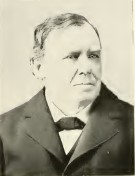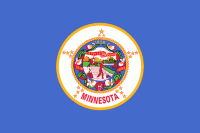Progressive Men of Minnesota
Minneapolis Journal
1897
 IGNATIUS DONNELLY was born in Philadelphia in
the year 1831. His father, Dr. Philip Carroll Donnelly,
was an eminent physician of Philadelphia. He was a native
of the parish of Fintona, in Tyrone County, Ireland. He
came to America in the early part of the present
century, and in 1826 married Aliss Catherine Frances
Gavin, who was born in Philadelphia in 1810; a daughter
of John Gavin, who came to this country from Tyrone
County in the latter part of the last century. Mr. Donnelly’s
mother died on June 13, 18S7, at Philadelphia. She was a
woman of great mental endowment. The Donnelly family is
supposed to have settled in the northernmost part of
Ireland more than two thousand years ago. From this
point they have found their way inward during the
succeeding centuries to the center of Tyrone
County. Dr. Donnelly, the
father of Ignatius, held a number of important positions
in and about Philadelphia, and was one of the founders
of the Philadelphia College of Medicine. He was
respected by all who knew him and was long remembered by
the poor of Philadelphia for his many charities.
IGNATIUS DONNELLY was born in Philadelphia in
the year 1831. His father, Dr. Philip Carroll Donnelly,
was an eminent physician of Philadelphia. He was a native
of the parish of Fintona, in Tyrone County, Ireland. He
came to America in the early part of the present
century, and in 1826 married Aliss Catherine Frances
Gavin, who was born in Philadelphia in 1810; a daughter
of John Gavin, who came to this country from Tyrone
County in the latter part of the last century. Mr. Donnelly’s
mother died on June 13, 18S7, at Philadelphia. She was a
woman of great mental endowment. The Donnelly family is
supposed to have settled in the northernmost part of
Ireland more than two thousand years ago. From this
point they have found their way inward during the
succeeding centuries to the center of Tyrone
County. Dr. Donnelly, the
father of Ignatius, held a number of important positions
in and about Philadelphia, and was one of the founders
of the Philadelphia College of Medicine. He was
respected by all who knew him and was long remembered by
the poor of Philadelphia for his many charities.
His son, Ignatius, was educated in the
public schools of Philadelphia, graduating from the
Philadelphia High School in 1849. Soon afterward he
entered upon the study of law in the office of Benjamin
H. Brewster, later attorney-general of the United
States. In 1853 he was admitted to the bar, and at once
entering upon the practice of his profession soon built
up a considerable business. Mr. Donnelly was
nominated by the Democrats in 1855 for the state
legislature, but declined the nomination because of
difference of opinion with the party on the slavery
question. During the same year he was married to Miss
Katherine McCaffrey, who was a native of Philadelphia,
and had been principal of a boys’ grammar school in that
city. This was the beginning of an exceptionally happy
married life. In the spring of 1856, Mr. Donnelly,
accompanied by his wife, made a journey through the
west, visiting Chicago, the state of Iowa, and finally
St. Paul. He was so pleased with the prospects of
Minnesota, that, with Mr. John Nininger, brother-in-law
of Governor Ramsey, he purchased six hundred and forty
acres of land in Dakota County and laid out the town of
Nininger. The new town throve apace, but unfortunately
about one year later the panic of 1857 swept over the
country and Nininger collapsed under the blow. Mr.
Donnelly had built a beautiful house, but found himself
practically bankrupt. It was during this same year that
Mr.
Donnelly first entered politics. He was nominated
for state senator by the Republicans of his county, but
was defeated. Next year he was nominated again and was
beaten by only six votes. Mr. Donnelly was
by this time becoming thoroughly identified with the
life of his adopted state.
In November of 1858 he resumed the
practice of law; shortly afterwards forming a
partnership with Archibald M. Hayes and Oren T. Hayes,
the name of the firm being “Hayes, Donnelly and Hayes.”
At the same time Mr. Donnelly organized the Agricultural
Society of Dakota County, which was one of the first
societies of its kind organized in Minnesota. It was
during the following year that Mr. Donnelly first
appeared on the lecture platform. His first lecture was
on “Style and Composition as Indicative of Character.”
This lecture was repeated at other places and was highly
commended ; the people of the new territory began to
realize that a man of superior intellectual attainments
had come among them. On June 20, 1859, Mr. Donnelly’s
name was presented for nomination as lieutenant-governor
before the Republican convention. On the third ballot he
was nominated, and was probably one of the youngest men
ever placed in this position. The campaign which
followed was a most active one and Donnelly stumped the
state most effectively. For the first
time the Republican party carried Minnesota. It was
during his service as lieutenant governor that Mr.
Donnelly had the opportunity of issuing a proclamation,
as acting governor, calling for volunteers, in response
to the national call issued by President Lincoln. Much
of the executive work pertaining to the enlistment and
organization of the regiments devolved upon the
lieutenant-governor. In 1861 he was renominated and
re-elected lieutenant-governor by a large majority, and
in 1862 was nominated for Congress without opposition.
Within a month after his nomination the Sioux massacre
occurred. There was a call for volunteers, and Donnelly
joined General H. H. Sibley, who was to be in command of
the relief expedition, and went to the front, in the
election that fall, Mr. Donnelly had about one thousand
two hundred majority. He took his seat in the House in
December, 1863, as a member of the Thirty-eighth
Congress. It was early in his congressional career that
Mr. Donnelly wrote a famous letter to Thaddeus Stevens,
protesting against the swindle incorporated in certain
estimates for expenses required to carry out the
stipulations of the Indian treaty of the Chippewas, of
March, 1863. Mr. Donnelly charged that enormous amounts
would be stolen if the estimates were accepted. The
letter created a sensation, and Mr. Donnelly regards it
as the turning point in his political career. He
believes it was the initial cause of the great
opposition to his renomination to Congress, and of the
enmity which many politicians felt for him during
succeeding years. However, he was re-elected and took an
active part in the proceedings of the Thirty-eighth and
Thirty-ninth Congresses. There was much opposition to
his renomination in 1866, but notwithstanding the bitter
fight waged against him, he was not only renominated but
re-elected over Colonel William Colville, a strong
Democrat, of a brilliant war record, by a majority of
four thousand two hundred and sixty-eight votes. This was his
last term in Congress. It was during this term that the
famous conflict with Elihu Washburn took place. This
contest with a powerful man, backed by a still more
powerful circle of political friends, made Donnelly
famous. His speeches in Congress attracted national
attention.
But in the campaign for renomination Mr.
Donnelly was nominated by part of the convention, and
General Hubbard by the remainder. Hubbard subsequently
withdrew and Donnelly’s enemies set up General C. C.
Andrews in his place, who drew of enough votes to defeat
Donnelly, and a Democrat. Eugene Wilson, was elected. In
1869 he became a candidate for United States Senator,
but Governor Ramsey secured the nomination after a hot
political battle. After his defeat, in 1868, for
Congress, Mr. Donnelly continued to act with the
Republican party until 1870. In that year, at the
written solicitation of three thousand five hundred
Republicans he consented to run for Congress on a low
tariff platform, at the same time receiving the
endorsement of the Democrats. In 1872 he supported
Horace Greeley as a Liberal Republican. He was prominent
some years later in the organization of the State
Farmers’ Alliance, with which he was closely identified
as long as it remained a force in politics. Since the
organization of the People’s Party he has been a
conspicuous member not only of the state but of the
national organization. During the past twenty years he
has served a number of terms in the state Senate and
House of Representatives. In 1878 he was
the candidate for Congress of the Independent
Greenbackers, and received the endorsement of the
Democratic party. His Republican opponent was W. D.
Washburn and as a result of the close election there
followed a somewhat sensational but unsuccessful contest
before the Elections Committee of Congress.
Throughout his long political career Mr.
Donnelly’s pen had not been idle. He nearly always had
some sort of a literary venture on hand, and was almost
continuously an editor of some kind of a newspaper.
During the winter of 1880-81 he attempted something more
extended in literary work. His first book was
“Atlantis,”’ which received very extended notice and was
reprinted in England, and translated and published in
France and Germany. More than twenty editions have been
printed in different languages. “Ragnarok,” followed and
achieved almost as wide a reputation as its predecessor,
the first edition of five thousand copies was sold in
two months. This has also been republished in England.
But Donnelly’s greatest literary celebrity is due to his
“Great
Cryptogram,” in which he endeavors to establish Bacon’s
authorship of Shakespeare’s plays. In 1889 “Caesar’s
Column” appeared. Of this book seven hundred thousand
copies have been sold, and it has been translated into
several languages. It was followed a year or so later by
“Dr. Huguet,” an appeal to charity written on behalf of
the negroes; and this was followed by “The Golden
Bottle,” which has been extensively printed in England
and other countries. It is an attempt to show, by a
romance, that the solution of the world’s troubles is an
abundant supply of money. Mr. Donnelly has
never been known to make a statement of his religious
views. He has never been a member of any church, but his
friends say that his books show the profoundest respect
for Christianity and a most unshaken belief in the
immortality of the soul. Mr. Donnelly’s character is
described as a most extraordinary’ combination of fierce
determination, amiability and magnanimity. His remarkable
command of language, his oratorical powers, his ready
wit. his unflagging industry and undoubted courage, have
contributed in their several ways to the development of
his most interesting
career.



